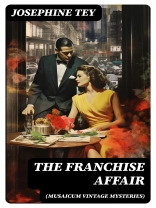In ‘The Franchise Affair, ‘ Josephine Tey masterfully intertwines psychological suspense with a razor-sharp critique of societal norms in post-World War II England. The narrative unfolds as truth and deception blur, centering around a seemingly straightforward yet troubling abduction case involving two women accused of kidnapping a teenage girl. Tey’s literary style is characterized by her keen observations and rich characterizations, inviting readers into a world where moral ambiguities reign. This novel stands as a profound commentary on gender, class, and the nature of justice, set against the backdrop of a transforming British society that grapples with the aftermath of war. Josephine Tey, born Elizabeth Mackintosh, was a Scottish author celebrated for her ingenious blending of detective fiction with social critique. Her background in theater and her experiences during the interwar years influenced her narrative style and thematic explorations. Driven by a desire to challenge societal conventions, Tey’s work often reflects her belief in the complexity of human motives and the shadowy intersections of right and wrong, elements that are inherently present in ‘The Franchise Affair.’ I highly recommend ‘The Franchise Affair’ to readers who appreciate rich psychological depth and intricate plots that expose the darker facets of human nature. Tey’s novel not only captivates as a mystery but also provokes thoughtful discourse on justice, gender stereotypes, and the fallibility of perception, solidifying its timeless relevance.
Про автора
Josephine Tey (1896–1952) was the pen name of Elizabeth Mackintosh, a Scottish author best known for her contributions to the mystery genre. Her writing is often acclaimed for its keen psychological insights and the vividness of her character portrayals. She was born in Inverness, the daughter of a fruiterer, and attended Anstey Physical Training College in Birmingham. Before becoming a full-time writer, she worked as a physical training instructor. Tey began her writing career with plays under the pseudonym Gordon Daviot, gaining some measure of success. Her first crime novel, ‘The Man in the Queue’, was published in 1929, introducing the character Inspector Alan Grant, who would appear in several of her later works. Among her most famous novels is ‘The Franchise Affair’ (Musaicum Vintage Mysteries), which stands as a quintessential example of Tey’s literary style. The novel unearths the complexities of post-war England while scrutinizing the nature of justice and the perversion of truth in public perception. Unlike the conventional whodunit, this book does not revolve around a murder but rather an accusation of kidnapping, offering a penetrating look at the English class system and regional tensions. Tey’s writing is often marked by subtle narrative techniques and a focus on the undercurrents of society, which has cemented her as a distinguished figure in the crime fiction canon.












